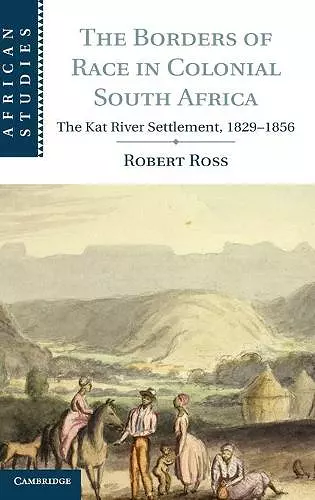The Borders of Race in Colonial South Africa
The Kat River Settlement, 1829–1856
Format:Hardback
Publisher:Cambridge University Press
Published:25th Nov '13
Currently unavailable, and unfortunately no date known when it will be back
This hardback is available in another edition too:
- Paperback£36.99(9781107616578)

This is the detailed narrative of the Kat River Settlement, located on the border between the Cape Colony and the amaXhosa in the Eastern Cape of South Africa during the nineteenth century. The settlement created a fertile landscape and developed a political theology of great political and racial importance to the evolution of the Cape and South Africa as a whole.This book provides a detailed narrative of the Kat River Settlement in the Eastern Cape of South Africa during the nineteenth century. The settlement was created by the British to use the Khoekhoe as a living barrier between the Cape Colony and the amaXhosa. It was fought over with some regularity, however, and finally broken up after some of the Khoekhoe joined the amaXhosa in their war against the colony. Nevertheless, in the time that the settlement existed, the Khoekhoe both created a fertile landscape in the valley and developed a political theology of great importance for the evolution of South Africa. They were also the subjects of - and participants in - the major debates leading to the introduction of a liberal constitution for the Cape in 1853. The history of the settlement is thus crucial in understanding the development of both colonial racism and the creation of the colony's non-racial democracy.
'Ross tells the tragic and compelling tale of the Kat River settlement in South Africa … Highly recommended.' C. V. Reed, Choice
'Professor Ross's exploration of the archaeology of the Valley (Chapter 2, 'Water and Land: The Making of the Settlement and of the Landscape') is a highlight of an excellent book. In the Frontier Wars of 1834 and 1846, people of the Kat River Settlement fought as levies on the British side. Despite these disruptions James Backhouse in 1836 observed that 'the neat cottages of those who have become more prosperous … would not discredit the more respectable of the labouring class in England'.' Tony Voss, African Studies Quarterly
ISBN: 9781107042490
Dimensions: 236mm x 158mm x 21mm
Weight: 570g
357 pages